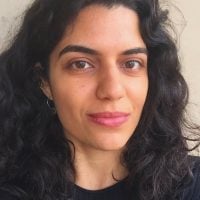View this post on Instagram
“To my brothers,
I tried to survive, but I failed. Forgive me.To my friends,
The experience has been harsh, and I am too weak to resist it. Forgive me.To the world,
You have been cruel to a great extent, but I forgive.”
LGBT+ queer activist Sarah Hegazy left this note behind before she took her life on June 13.
It shook the Egyptian community, and sparked a nationwide debate on LGBT+ rights in the country and across the Arab world. The only crime she committed was carrying a rainbow flag in a Mashrou’ Leila concert in Egypt, September 2017.
She was arrested on charges of “sexual deviance,” along with other activists, as part of a crackdown on the LGBT+ community. She then sought asylum in Canada, and lived there for two years before plunging into a state of depression due to the exile she was experiencing from her home, friends, and family.
The thing that struck me most was how the suicide was taking spotlight as a self-inflicted, self-imposed decision made in a vacuum, but not the reasons and injustices that drove Sarah to reach that state. The torture she faced in prison after she was arrested, the condemnation by her own country, and the shame projection by the conservative Egyptian community was too much for her to bear.
The environment that she was in played a huge role, and was the biggest participant in her depression. It seems, however, that society likes to wash its hands clean of all blame, and straightaway points toward sexuality being the source of suffering. If anything, Sarah was actually damn comfortable with her sexuality; otherwise, she wouldn’t have fought so hard for her rights to have it. She wouldn’t have sought asylum in Canada just for a chance to live freely and equally, as every human being should.
Being separated from our own community is hard. We rarely ever leave our homes, unless there is a greater pull to be elsewhere. Sometimes it’s driven by ambition and aspiration, perhaps to get a degree or continue higher studies. Other times, it’s to be nomads and travellers exploring the world. But seldom is seeking asylum ever for those reasons. When we leave and seek protection in another land, it’s because we don’t feel safe in our own home.
Refugees and asylum seekers understand this pain. Sarah understood this pain. But it was too much for her to deal with it, and in isolation.
What can we do to move forward as a society? How can Sarah’s death be more than just a headline that we forget next week?
Well, start by accepting the fact that people will be different than you. Accept that sometimes, even most times, you strive to be different from everyone yourself. It’s just that Sarah’s “different” is packaged in a skin you don’t feel comfortable wearing.
Being different is not a pedestal that you get to stand on, where you can judge how good or bad everyone’s “different” is. Being different is standing on plain ground, next to your fellow brother and sister in humanity, with equal footing. No one is above, no one is below.
Honestly ask yourself, “Where and when have I tried to be different, and how did I feel when I was met with rejection or ridicule?” You will most likely find that people often project their own judgement on you when your idea or opinion does not fit in with mainstream society, and we are socially and politically conditioned to be that way.
I am guilty of this myself, but I try to make a distinction between what is my conditioning and what is the culture’s. Sometimes I fail, and I get confused and frustrated, but there is no question about it that this is something I will continue doing. This is how we grow and find our individuality.
I understand that in a culture like ours, in Egypt, that is built on foundational, traditional religious principles, it can be hard to look at LGBT+ rights in a contemporary light, and to support something that has been condemned by the Islamic faith for so long. However, I’m not asking you to believe in it and invest yourself in it; I am asking that you create space for another to live without shame. This is basic. This is compassion.
I’m asking you to consider living a life where you don’t have to have a strong negative charge over someone else’s choice to live their life the way they want to. This also gives you the right to not have a strong positive charge either. Just practice pure, basic human understanding.
Instead of judging someone else for being different, be curious. Self-educate and learn about LGBT+ history if you can. Widen your scope of knowledge around the subject. Have difficult conversations about it with your friends and family. Hiding things under the carpet has never served anyone. Issues always resurface when we pretend they don’t exist, or it’s too taboo to talk about them.
Lastly, if you have a friend, family member, or someone you know who is suffering from depression—reach out. Tell them they are not alone, and learn how to hold space for them. This saves lives.


 Share on bsky
Share on bsky




Read 0 comments and reply